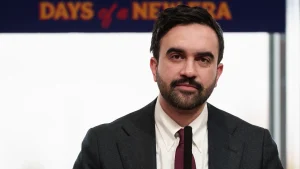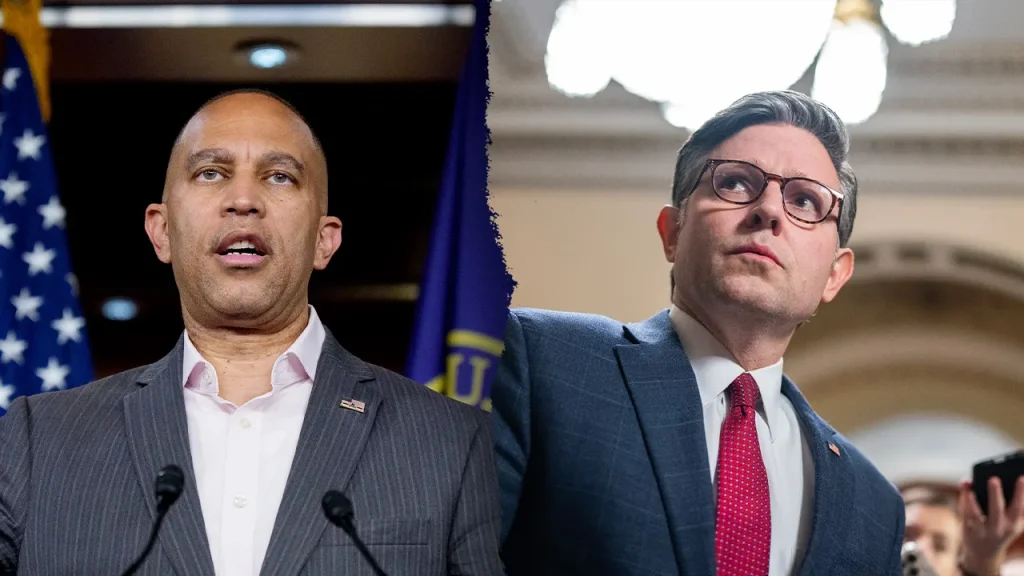House Speaker Johnson Dismisses Democratic Demand for Primetime Debate on Government Shutdown
In the midst of a government shutdown now in its sixth day, tensions between House Republican and Democratic leadership have escalated into public challenges and dismissals. House Minority Leader Hakeem Jeffries challenged Speaker Mike Johnson to a primetime floor debate “any day this week” that would be broadcast live to the American people. However, Johnson quickly rebuffed this request, characterizing it as a “publicity stunt” from a Democratic leadership whose messaging, he claimed, polls at only about 13% approval. “When the poll says that about 13% of the people approve of your messaging, then you make desperate pleas for attention, and that’s what Hakeem Jeffries has done,” Johnson told reporters, effectively shutting down the possibility of such a debate.
The core of the dispute centers on a House-passed short-term funding bill designed to keep the government running through November 21, which would provide congressional negotiators more time to establish fiscal year 2026 spending priorities. This bill passed the House largely along party lines—with only two Republicans opposed and a single Democrat in support—but has hit a wall in the Senate, where Democrats have rejected the GOP-led plan four times already. Johnson defended his chamber’s work, saying, “The House has done its job. I’m not going to let Hakeem try to pretend for theatrics… The ball is in the Senate’s court now.” He further emphasized that the debates have already taken place on the House floor, with Jeffries and his Democratic colleagues having had ample opportunity to present their arguments before the bill was passed.
The key sticking point fueling the shutdown appears to be the enhanced Obamacare subsidies that were expanded during the COVID-19 pandemic. These enhancements are set to expire by the end of 2025 without congressional intervention, and Democrats in both chambers, frustrated at being sidelined in federal funding discussions, have made extending these healthcare subsidies a priority. In his letter to Johnson, Jeffries wrote that “Democrats have been clear and consistent in our position,” calling for “immediate, bipartisan negotiations between the White House and congressional leadership” to reach an agreement that reopens the government while addressing what he termed “the Republican healthcare crisis.”
Jeffries further accused Republicans and Donald Trump of deliberately shutting down the government “because the GOP refuses to provide healthcare to everyday Americans.” He also criticized Johnson for keeping “House Republicans on vacation instead of working with Democrats to reopen the government.” This accusation highlights the increasingly partisan nature of the shutdown fight, with each side blaming the other for the impasse and using increasingly charged rhetoric to make their case to the American public. The shutdown, meanwhile, continues with no immediate resolution in sight, as the Senate remains unable to advance the House-passed funding measure.
While Johnson described Jeffries as “a friend and a colleague” whom he respects, he made it clear that he views the debate challenge as a political maneuver rather than a genuine attempt at resolution. “We don’t need to waste time on that nonsense. Those debates have been had,” Johnson stated, suggesting that the real decision-making power now rests with Senate Majority Leader Chuck Schumer. This perspective frames the shutdown as primarily a Senate problem, with Johnson portraying the House as having already fulfilled its responsibilities by passing a funding bill, albeit one that Democrats find unacceptable due to the healthcare subsidy issue.
The ongoing shutdown represents the first significant test of Johnson’s speakership during a critical pre-election period. As both parties dig in on their respective positions, the prospect of a quick resolution seems increasingly unlikely. The House passed its stopgap measure along largely partisan lines, while Senate Democrats have consistently blocked it, creating a legislative stalemate. Some bipartisan shutdown negotiations have reportedly begun on Capitol Hill, but so far these have not produced any breakthrough that could end the impasse. Meanwhile, federal workers remain furloughed or working without pay, and government services continue to be disrupted as the political standoff continues with each side blaming the other for the government’s closure.















